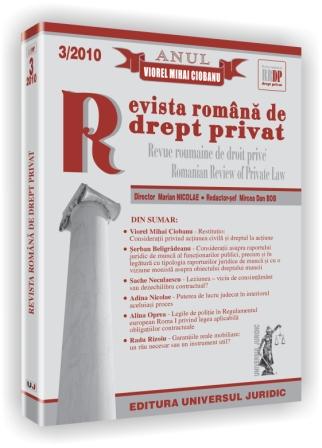Consideratii asupra raportului juridic de muncã al functionarilor publici, precum si în legãturã cu tipologia raporturilor juridice de munca...
Considerations on the legal work relation of civil servants, as well as on the typology of the legal work relations and a monistic vision on the objec
Author(s): Şerban BeligrădeanuSubject(s): Law, Constitution, Jurisprudence
Published by: Universul Juridic
Keywords: labor law; legal work relation; typology; object of labor law; monistic vision (includes all types of legal work relations
Summary/Abstract: The author, starting from a personal opinion, expressed in a previous study (published in 2000), namely that the civil servant’s work relation represents a typical form of a legal work relation, a relation that, although different from the individual labor contract (archetype of the legal work relation), is not however essentially different from the latter and, consequently, from a logical and legal point of view, the civil servant’s work relation is a basic component of the labor law (legislation), emphasizes afterwards that, in recent years, from the legal point of view, continuous effacement of differences between the legal work relation of employees and that of civil servants has been noted. Further on, the author presents the typology of current legal work relations and namely: the legal work relation of employees (generated by the conclusion of the individual labor contract, regulated by the Labor Code); the legal work relation of civil servants (generated by Law no. 188/1999 regarding the Statute of Civil Servants or by certain statutes regarding special categories of civil servants, such as, for instance, police officers, diplomats and consuls, customs personnel etc.); the legal work relation of career military staff (non-commissioned officers and officers – Law no. 80/1995); the legal work relation of persons holding public positions; the legal work relation of magistrate (whose statute is subject to Law no. 303/2004); the legal work relation between the cooperative company and cooperative members(Law no. 1/2005). As regards this typology of legal work relations, the author considers it is fundamentally erroneous to limit the object of labor law exclusively to the legal work relation employees (regulated by the Labor Code), and firmly considers that all the above-mentioned legal work relations are, in the monistic vision of labor law, components of the Romanian labor law, whose summa divisio is made of the common labor law (regarding the legal labor relation of employees, based upon the individual labor contract regulated, mainly, by the Labor Code provisions) and, on the other hand, by the special labor law (including the legal labor relations of civil servants and military staff, of persons holding public positions, of magistrates and of cooperative members), a special labor law focused on regulations different from the Labor Code, but for which the Labor Code represents, nevertheless, the common law.
Journal: Revista Română de Drept Privat
- Issue Year: 2010
- Issue No: 03
- Page Range: 20-44
- Page Count: 25
- Language: Romanian
- Content File-PDF

